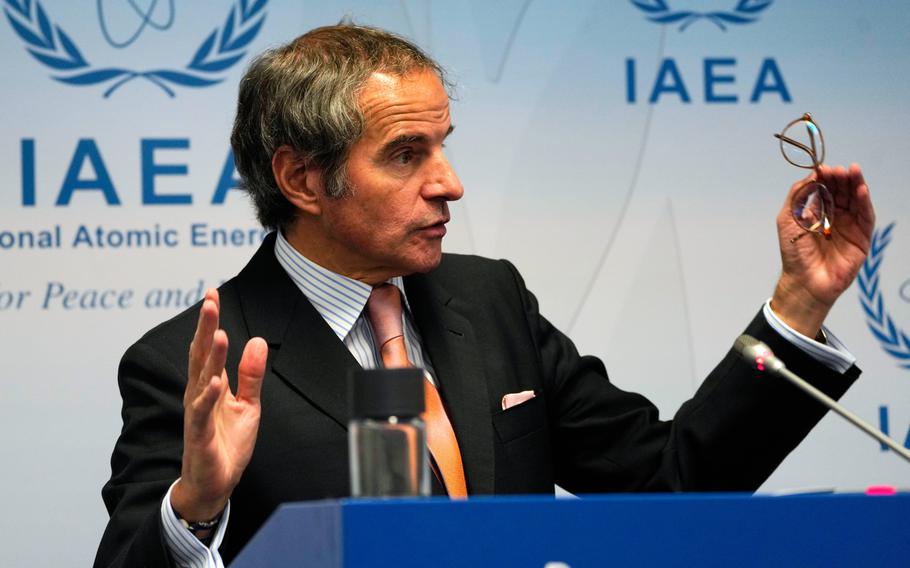
Rafael Mariano Grossi, the director-general of the International Atomic Energy Agency, speaks to journalists in Vienna, Austria, on May 28, 2025. (Jon Gambrell/AP)
(Tribune News Service) — Iran said it would establish a new uranium-enrichment center in response to a decision by the United Nations atomic watchdog to censure the Islamic Republic over its nuclear program, deepening a crisis that’s also drawn in the U.S. and Israel.
The new site will be at an unspecified secure location, and will be accompanied by the replacement of enrichment devices at an existing site, Fordow, with newer machines, the Atomic Energy Organization of Iran said in a statement Thursday. Other measures will be announced later, it said, without elaborating.
“This will mean a significant increase in the production of enriched materials,” AEOI spokesman Behrouz Kamalvandi told the state-run IRNA news agency.
The lack of detail about the new facility potentially puts Tehran further in breach of its IAEA obligations, which specify that inspectors need to receive early notification of any move to expand production.
The International Atomic Energy Agency’s board of governors approved a resolution in Vienna on Thursday that deemed Iran in non-compliance of its international obligations, setting up a potential referral to the U.N. Security Council for a renewal of sanctions.
Ahead of the vote, Iran’s ambassador to U.N., Saeid Iravani, said his country’s response to a censure that triggered the renewal of Security Council sanctions could include “initiating the process of withdrawing from the Treaty on the Non-Proliferation of Nuclear Weapons,” according to IRNA.
The breakdown in nuclear diplomacy comes alongside a corresponding rise in regional tensions. The U.S. ordered some staff to depart its embassy in Baghdad and authorized families of military service members to leave the region, officials said, while U.S. President Donald Trump said he’s growing less confident about the prospects for a successful deal to impose new limits on Iran’s nuclear program.
Iran warned it could hit U.S. military assets in the Middle East if the talks collapse and the Islamic Republic is attacked. Oil prices rose the most since October on the mounting tensions, before paring gains on Thursday.
Negotiations between Iran and the Trump administration have stalled over whether or not Tehran’s engineers will retain their right to enrich uranium. The U.S. and Israel have publicly insisted Iran can’t possess that key technology — critical for producing the fuel needed for nuclear reactors and bombs.
“A comprehensive deal is likely contingent on the U.S. allowing Iran to retain some domestic enrichment capacity,” analysts at the Eurasia Group wrote in a note this week.
Iran has previously offered to end its ramp up of highly-enriched uranium in exchange for sanctions relief, after producing a record volume over the last quarter. That material could quickly be turned into the fuel for the equivalent of 10 bombs, should Iran’s leadership take the political decision to pursue weapons.
While Tehran’s officials provided few details about its new enrichment facility, analysts and diplomats have previously flagged tunneling and construction activities near its Natanz enrichment site in central Iran. The IAEA has been provided with design information about the new site, according to Kamalvandi.
The IAEA’s vote was highly divided, with 19 in favor — led by the U.S. and European nations — and three against, including China and Russia. There were 11 abstentions.
The resolution, which says the IAEA is unable to determine that Iran’s program “is exclusively peaceful,” gives the Islamic Republic an indeterminate amount of time to resolve issues with inspectors, who are probing the detection of uranium particles at several undeclared locations.
Should Iran fail to satisfy the watchdog, the IAEA’s board may convene an extraordinary meeting as early as July to refer the case to New York.
Russian diplomats, who have been asked by the Trump administration to facilitate a diplomatic solution with Iran, cautioned that passing the IAEA vote of censure carries significant risks.
“The adoption of the presented resolution will significantly reduce the chances” of a diplomatic resolution, wrote Moscow’s IAEA envoy Mikhail Ulyanov in a statement. Instead, “such an escalation will have the most negative consequences both for the IAEA and for the entire non-proliferation regime.”
©2025 Bloomberg L.P.
Visit bloomberg.com.
Distributed by Tribune Content Agency, LLC.